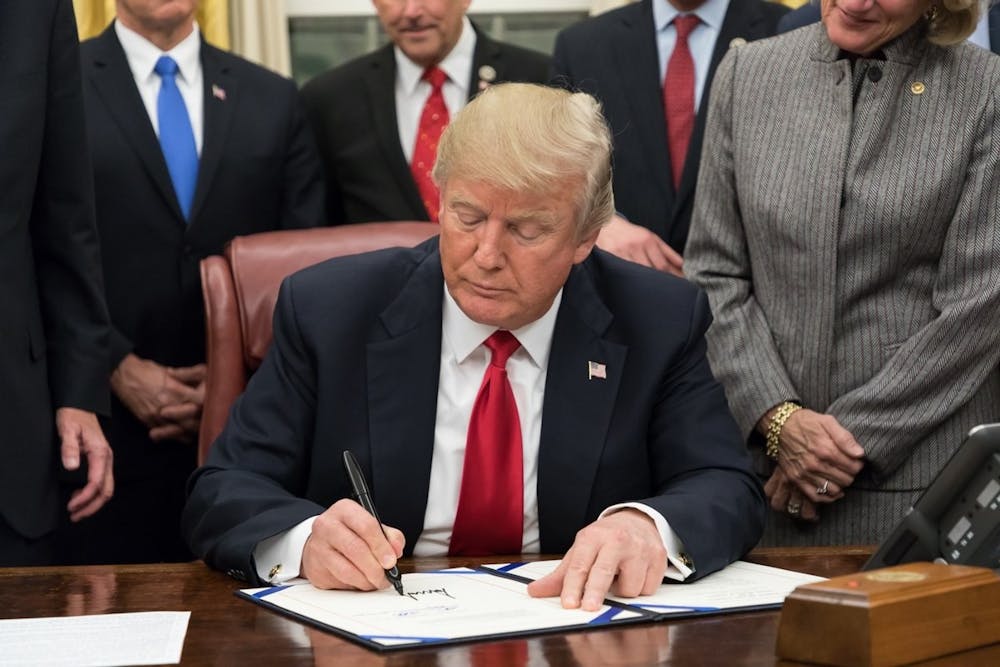中文版请点击此处
Albania, Brazil, Chile, Cuba, Greece — these are only a few counties where the United States has supported fascist authoritarian governments in order to combat communism. Anti-communist sentiments continue to reverberate in American politics. Today, the political theory of socialism is under siege as some fear a larger central government and loss of economic freedoms. Under democratic socialism, citizens collectively own and distribute resources through a democratically elected government. In America, democratic socialism is popularized as simply socialism.
While Republicans politicians may claim that this idea is very popular amongst American liberals, this theory is not actually widely supported across America. Contrastingly, fascism and its many characteristics, including high militarization and hypernationalism, pose a greater threat to American democracy than socialism. Although we are not likely to see the emergence of a socialist or fascist government in the present age, we have already witnessed the seeds of fascism in American politics.
We must be aware of how fascism arose in the past to understand why fascism is more relevant than ever. In the 1930s in Western Europe, fascism arose from the ashes of economic collapse and imminent war. These are pre-conditions for government dependency as a solution, or disillusion with the current government. America is currently experiencing these conditions following a pandemic and economic collapse. Whether Americans will simply demand a government solution or a new government structure — and what the structure would look like — remains in contention.
Despite defeating fascist powers during World War II, there is a disturbing resurgence of fascist rhetoric in America — ignited by President Donald Trump. To preface, many experts agree Trump is not a fascist. Rather, some political scientists prefer the terms populist or kleptocrat. Regardless, the need to even clarify his ideological alignment is concerning. The danger lies in how the Trump administration has embraced the semblance of fascism in speech and policy. For example, Trump exudes ultranationalism in speeches and has dismissed political dissidents. Some Democrats even claim Trump attempted to suppress political opposition by withholding funds from the U.S. Postal Service during an election cycle heavily reliant on mail-in voting.
These examples are distressing, however perhaps not as distressing as the infamous Executive Order 13769 — or Trump’s “Muslim Ban.” Within fascist ideology, there is often a disdain for human rights, and this order was specifically condemned by the United Nations as a human rights violation. The disregard and outright violation of human rights should concern all Americans and place the limits of democracy into question. We must consider whether we’ve reached the boundaries of representative democracy or if America has become desensitized to fascism. Especially, if the NO BAN act — the bill created in opposition and as a response to the executive order — dies in the Senate.
Conversely, socialism is not nearly as prevalent in current American politics. Historically, the Great Depression led many Americans to become disenchanted with capitalism, and under New Deal legislation, President Franklin Roosevelt passed several socialist-like policies such as social security. But in recent decades, we’ve seen the increasing resistance against socialist reforms from both moderate Democrats and Republicans. This trend, along with an anti-communist past, suggests that Americans may not accept socialism as a solution.
America has a complicated and often violent political history of militarism, imperialism, colonialism and nationalism. However, America has repeatedly demonized communism on American soil with the First Red Scare of 1919 and the McCarthy trials of the 1950s. Globally, America enacted military interventions and staged coup d'états throughout and after the Cold War. Simultaneoulsy, America supported anti-communist militant dictators and regimes that perpetuated human rights abuses. If history is any indicator of the future, the American populace remains vehemently opposed — or at least resistant — to socialism. With the selection of former Vice President Joe Biden as the democratic nominee as opposed to Senator Bernie Sanders, it has become clear that even Democrats are not ready for a socialist leader. Despite the current trend of a rising population of young voters supporting socialism being a valid concern, there is subsequently a trend of electing older and older presidents, and opposition to socialism often increases with age.
In addition to the resistance of socialism among Democractic voters, there is even less support among politicians in Congress. Implementation of American socialism would require the unification of progressives and moderates, as well as the agreement of many Republicans. This is not likely to occur, at the very least, within the next four years. Additionally, progressive Democrats comprise a small fraction of Congress. Most are moderate Democrats who do not advocate for socialism, only agreeing with certain policies. The progressive agenda, including universal healthcare and the Green New Deal, continue to face resistance from moderate Democrats. Therefore, it is unlikely Congress would fully support truly socialist policies such as worker control.
Whether Trump wins the election or not, he has pushed the boundaries of democracy for himself while retracting it for many citizens. Trump’s maneuvering of political roadblocks and what little power the opposition was able to exercise is disturbing and sets a precedent for future presidents. We, as the American people, must eliminate signs of fascism in its stead. We must protect the rights of minority groups, of women and of political opposition. As evidenced by history, fascism will not go away quietly. What has impeded the rise of fascist principles have been social movements led by the people. As citizens, as voters and as the American people, we have a moral obligation to squash fascism. We must extend the boundaries of our representative democracy, pushing against the roadblocks imposed by bureaucracy and partisan divide. We must be unafraid of change, unafraid of justice and unafraid of reform for the prosperity of current and future generations.
Yssis Cano-Santiago is a Viewpoint Writer for The Cavalier Daily. She can be reached at opinion@cavalierdaily.com
The opinions expressed in this column are not necessarily those of The Cavalier Daily. Columns represent the views of the authors alone.







